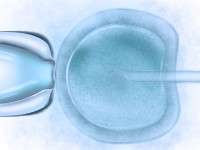'Molecular scissors' could prevent genetic diseases before conception

Scientists from our Department of Biology & Biochemistry have developed a new technique that will streamline biomedical research and could in the future prevent genetic diseases before the moment of conception.
In a study published in the Nature Group journal Scientific Reports, the scientists used 'molecular scissors' that can edit the DNA of either the egg or sperm of mice during fertilisation.
The researchers used the enzyme Cas9 to cut a precise point in the genome, enabling them accurately to inactivate a specific gene. This allows scientists to study specified gene function in mice by creating a 'knock-out' in closer to one month rather than the six required using conventional techniques.
This powerful tool should accelerate biomedical research and promises to reduce the number of animals used in experiments to answer fundamental medical questions.
Dr Tony Perry, the study's senior author at the University's Laboratory of Mammalian Molecular Embryology, explained: "We're really excited about this research. Previously, this technique had been demonstrated with established embryos but we've shown that we can accurately edit genes in the sperm or egg around the time of fertilisation, just as the embryo is starting to develop.
"Cas9 works by cutting the DNA at a precise point in the genome. The cell repairs this cut but chews the frayed ends before rejoining them, destroying the function of the gene.
"The technique has many exciting potential applications. It could help to provide disease resistance to livestock or perhaps provide a method for preventing serious genetic conditions in humans at the point of conception - for example by allowing carriers of life-threatening genetic conditions such as cystic fibrosis to conceive healthy babies without the risk of passing on the disease."
Researchers anticipate that the method could also be used to enable the transplant of organs of some large animals into humans without the problem of rejection, by making the organs immunologically invisible.
Dr Perry added: "This is a dream for transplant surgeons and patients awaiting immunologically matched organs. It means that one day it may be possible to transplant these engineered organs - even if only until a suitable human one is found - and save lives."
More information: "Asymmetric parental genome engineering by Cas9 during mouse meiotic exit." Scientific Reports 4, Article number: 7621 DOI: 10.1038/srep07621
Journal information: Scientific Reports
Provided by University of Bath



















